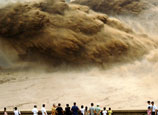
HEZHOU, Guangxi, July 7 (Xinhua) -- A preliminary investigation found that illegal sewage discharge from mining enterprises could be the source of river pollution in south China's Guangxi Autonomous Region, local authorities said.
As of Sunday, 112 enterprises along the Hejiang River in Hezhou City had been investigated and forced to suspend production after dead fish have been found in a section of the river since July 1.
"Relevant departments in Hezhou have launched investigations into enterprises, including some mining enterprises along the Hejiang River, one by one, to find the source of the pollution," Bi Haidong, deputy mayor of the city told Xinhua on Saturday evening.
Government authorities of Fengkai County, south China's Guangdong Province, which neighbors Guangxi, on Saturday warned that water in a section of the Hejiang River has been tainted by upstream pollution.
An initial investigation suggests that the pollutants are thallium and cadmium, Fengkai's publicity department said in a statement.
Both thallium and cadmium are toxic to human beings.
Bi said some small-scale mining companies in Hezhou always conduct illegal actions to exploit and wash minerals, and they discharge sewage without treatment or disposal, which can result in pollution.
Hezhou has lots of mineral resources, including manganese, tungsten, rare earth, cadmium and thallium.
As of Saturday evening, the cadmium density in the section of the river between Guangxi and Guangdong has met standards, while the density of thallium remained beyond the allowed maximum level, according to monitoring data from the local environmental protection department.
"The monitoring data was not good, but the situation is under control," Bi said.
Further investigation is under way.
















 First panda born in Taiwan is female | Photos
First panda born in Taiwan is female | Photos


![]()
